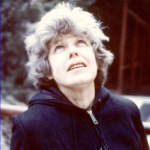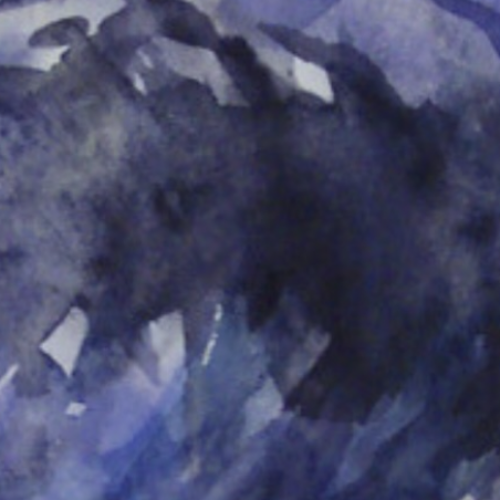This piece was shared with us by Amy Losak, daughter of the author, Sydell Rosenberg (1929-1996). While Rosenberg’s short stories are works of fiction, they are loosely based on her life as the daughter of immigrant Eastern European Jews in New York City.
I was a child of the forties in New York City, and I knew what a “long, hot summer” was long before the sociologists. This story is about one long, hot summer I spent in Midtown.
She was tall, toothless, and wispy-haired. I remember her shaking me wildly and shrieking, “Don’t you respect Nature?” I remember trying to emit the necessary word, “Yes,” but was unable to get it out of my mouth.
However, quick-tempered old woman, let me answer you now. Yes, I respected Nature—and I respected Her as only a city child can. My eyes would gleam with delight whenever I spied a single green tree or the even-rarer cluster, so sparsely dispersed amid the city. My nose quivered to smell a flower that grew in a pot or window garden planter on a fire escape. My hands would reach forward with exotic expectation to touch the waxy petal.
And yet, I was a step-child of Mother Nature. All city kids are.
“In the good old summertime,” we sat on steamy stoops and quickly licked the drips from our melting ice creams. Sweating, we sprinted along hot pavements to catch the strong, spraying water from sanitation department trucks. We would spend the day riding up and down escalators in air-conditioned department stores filled with crisp clothes and other goods. We read countless magazines for hours in silent, cool libraries. Once in a while, we read letters from some of our more fortunate friends who had gone to the country. They would write, “The air out here is very good. Wish you were here.” But we were at home in the city, bathing in the clinging humidity that stuck to our skin.
There were some people, it is true, who understood our situation. One was a hardware storekeeper. I can still see him seated on a closed keg of nails, holding a newspaper, his eyeglasses gliding down his nose. We could step into the cool darkness of his store when there were few or no customers. He permitted us to play store with his merchandise. I can still hear the tearing sound of the shiny oilcloth as it unfurled into colorfully sprigged patterns. The summer had only just started, but this material was the harbinger of the fall semester. It was waiting for our soiled textbooks. It was willing to hide the sullied skins of those books, so that we might carry them with more pride. I can still smell the empty tanks of kerosene. The poor people could not use it during summer, for their homes were as boiling in the summer as they were freezing in the winter.
I can still see the toilet, tucked away in the storage room. We would jump into this room whenever there were many customers. And it was from this unlikely refuge that we glimpsed Nature.
How we did this was a minor miracle. My friend was twisting the stiff faucets of the sink for some water. As it sputtered out in a feeble, rusty stream, I saw a dull square of a window in the front part of the room. Aimlessly, I pulled away a strip of the dark paper covering the square, and spotted an expanse of light. It was a backyard—a backyard we never knew existed. It had trees and flowers. There were little barrels of tender nursling plants. There was a planked shack. Most glorious of all was a wrought iron sun hung on the side of the shed, its faded gold and smiling face welcoming and playful.
Ideas crept into our minds. Wouldn’t it be so marvelous to have this place for the summer? We could live in the shack. We could bring food, books—everything we needed. Nobody knew about this place. We could fix it up. It would be ours alone, for it was our discovery.
And so it happened that whenever we could, we worked to loosen the window, to scrape away the paper and better envision what was to be ours. One day, with squeaks of protest, the window finally opened. We had wanted to plunge through the opening dramatically, to feel the zestful freedom of entrance, but instead, we curled our hands under the dusty sill and hesitantly jabbed our feet at the strange ground.
We were in! From the other side, we closed the window. And then, peculiarly, we did not know what to do next. We walked around circumspectly. The shack was locked with immobile, massive fasteners. The little tendrils of nursling plants bobbed gently in the breeze, like miniature green pennants. Their roots settled in the thick soil, as if to remind us that they had a safe place in which to grow.
Dizzily, I squatted before this mockery, and started to knead the soil as if it were warm dough in my hands. The little leaves were no longer glistening with green, but were smudged by the clumpy earth. I continued to dig, even though I now wanted to leave the yard. I remember my friend reprimanding me, but I retorted that I knew all about plants, and that this would make them grow better. She started to rearrange the rocks in the garden.
Suddenly, the tall, toothless woman appeared. She screamed at us madly, her arms swinging like branches: “Don’t you respect Nature?”
We found out later that she was the superintendent of the building next door. We learned that the yard belonged to her. We should not have been there. The window had to be shut tight once again, and new dull wrapping paper was pasted onto it. We have never seen the place since then.
From that time on, I avoided the superintendent whenever I could. But if I were to see her now, I would tell her my feelings about Nature. I would erect a tiny chapel, my lyrical call to worship over the door: Though I respected Nature, nobody gave Nature a chance to respect me.





